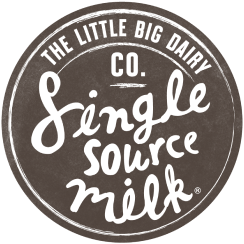From the moment we are born, milk makes up an integral part of our diet. This nutrient-rich liquid has been an important staple for centuries, valued for its creamy taste and health benefits. Full of calcium, protein, and essential vitamins, milk supports bone health and overall nutrition. From dairy to plant-based alternatives, it comes in various forms to suit different dietary needs, preferences and culinary requirements, which is why milk will always remain a versatile and important part of daily life. Discover more about what’s in your milk and why it matters for your health.

What Milk is Made From?
Have you ever wondered what’s in your milk, the smooth white substance that we use daily in both drinks and food? This natural liquid is produced by the mammary glands of mammals, primarily to nourish their young, but is extremely safe for human consumption (most commonly, milk from the cow). It is made from a combination of:
- Water – About 87% of milk is water, which helps keep the body hydrated.
- Lactose – A natural sugar that provides energy and gives milk its slightly sweet taste.
- Fat – Present in varying amounts depending on the type of milk, fat provides the creamy texture and flavour.
Nutrient Content and Benefits
As well as water, lactose and fat, milk is rich in nutrients made from a wide array of essential vitamins and minerals. Its nutrient content makes it a valuable part of a balanced diet with a wide range of health benefits:
- Protein - Mainly casein and whey.
- Minerals – Most notably calcium, along with phosphorus and potassium.
- Vitamins – Especially B12, A, D, and riboflavin.
- Enzymes and Hormones – Naturally occurring substances.
The health benefits of the above are as follows:
- Bone Health: High calcium and vitamin D levels help build and maintain strong bones and teeth.
- Muscle Growth and Repair: Complete proteins in milk (casein and whey) support muscle development and recovery.
- Energy and Metabolism: B vitamins help convert food into energy and support cellular function.
- Hydration: The high-water content keeps the body hydrated.
- Heart and Nerve Function: Potassium and magnesium support heart rhythm, nerve signals, and muscle function.
- Immune Support: Vitamin A and zinc contribute to a healthy immune system.
Milk is especially beneficial for children, adolescents, and older adults, but can be part of a healthy diet for most age groups unless you are lactose intolerant or have a dairy allergy. If lactose is an issue, you might prefer lactose-free milk options.
From Dairy to Plant-Based
Today, there are various types of milk from whole to no fat to almond to coconut; each one catering to different dietary needs, with different tastes, textures, and nutritional profiles.
If dairy milk is your preference, you have a huge list to choose from. You can opt for whole or full-cream milk, which is rich and creamy, containing 3.25% fat. Or if you prefer your milk with a lower fat content, you have the option of reduced fat (or semi-skimmed) milk containing between 1–2% of fat or fat-free (skimmed) milk, which has no fat at all.
Other dairy options include:
- Lactose-Free Milk – Dairy milk with lactose removed; ideal for lactose-intolerant individuals.
- A2 Milk – Contains only A2 beta-casein protein, which may be easier to digest.
- Raw Milk – Unpasteurized milk straight from the cow (regulated in many places).
- Unhomogenised Milk – Cream rises to the top; not processed to blend fat.
If your diet requires you to avoid dairy, plant-based alternatives are extremely varied and healthy:
- Almond Milk – Light and nutty; low in calories.
- Soy Milk – High in protein; creamy and versatile.
- Oat Milk – Creamy texture; naturally sweet and great for coffee.
- Coconut Milk – Distinct flavour; higher in fat, popular in cooking.
- Rice Milk – Sweet and thin; allergy-friendly.
- Cashew Milk – Creamy with a mild, nutty taste.
- Hemp Milk – Nutty flavour; contains omega-3 fatty acids.
- Macadamia Milk – Buttery and smooth; good for frothing.
- Pea Milk – High in protein; creamy texture.
- Flax Milk – Light, with added omega-3s.






